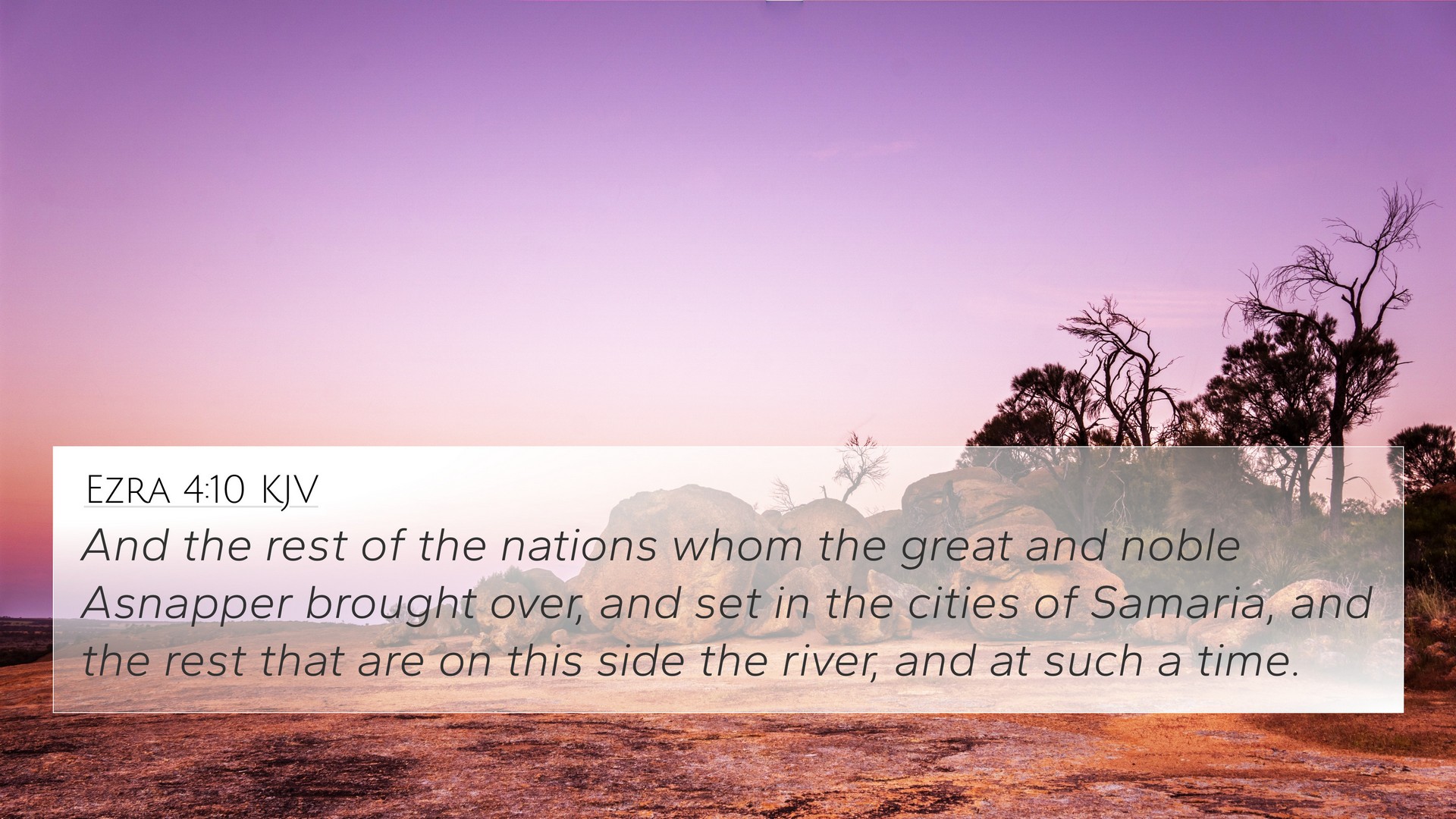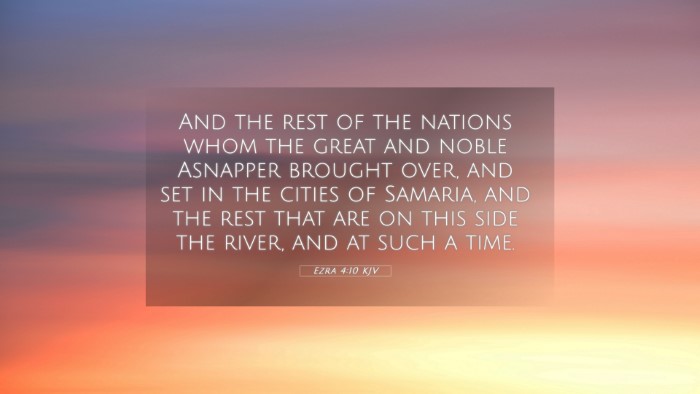Old Testament
Genesis Exodus Leviticus Numbers Deuteronomy Joshua Judges Ruth 1 Samuel 2 Samuel 1 Kings 2 Kings 1 Chronicles 2 Chronicles Ezra Nehemiah Esther Job Psalms Proverbs Ecclesiastes Song of Solomon Isaiah Jeremiah Lamentations Ezekiel Daniel Hosea Joel Amos Obadiah Jonah Micah Nahum Habakkuk Zephaniah Haggai Zechariah MalachiEzra 4:10 Similar Verses
Ezra 4:10 Cross References
And the rest of the nations whom the great and noble Asnapper brought over, and set in the cities of Samaria, and the rest that are on this side the river, and at such a time.
Uncover the Rich Themes and Topics of This Bible Verse
Listed below are the Bible themes associated with Ezra 4:10. We invite you to explore each theme to gain deeper insights into the Scriptures.
Ezra 4:10 Cross Reference Verses
This section features a detailed cross-reference designed to enrich your understanding of the Scriptures. Below, you will find carefully selected verses that echo the themes and teachings related to Ezra 4:10 KJV. Click on any image to explore detailed analyses of related Bible verses and uncover deeper theological insights.

Ezra 4:17 (KJV) »
Then sent the king an answer unto Rehum the chancellor, and to Shimshai the scribe, and to the rest of their companions that dwell in Samaria, and unto the rest beyond the river, Peace, and at such a time.
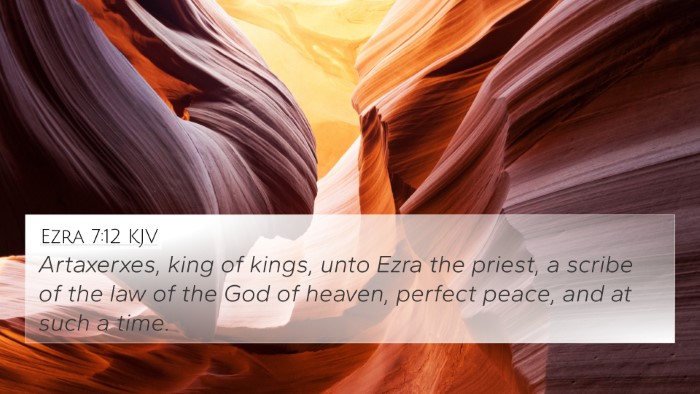
Ezra 7:12 (KJV) »
Artaxerxes, king of kings, unto Ezra the priest, a scribe of the law of the God of heaven, perfect peace, and at such a time.
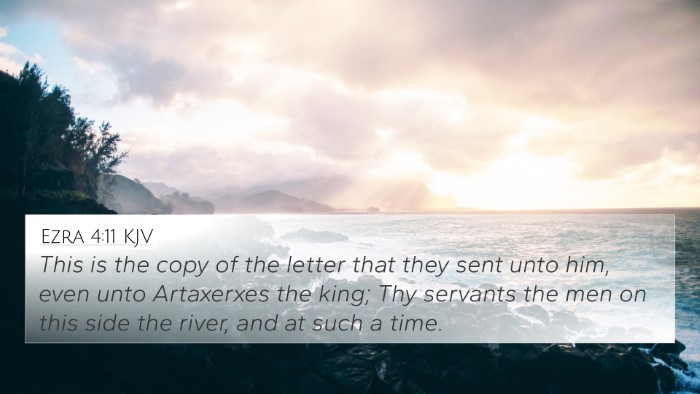
Ezra 4:11 (KJV) »
This is the copy of the letter that they sent unto him, even unto Artaxerxes the king; Thy servants the men on this side the river, and at such a time.
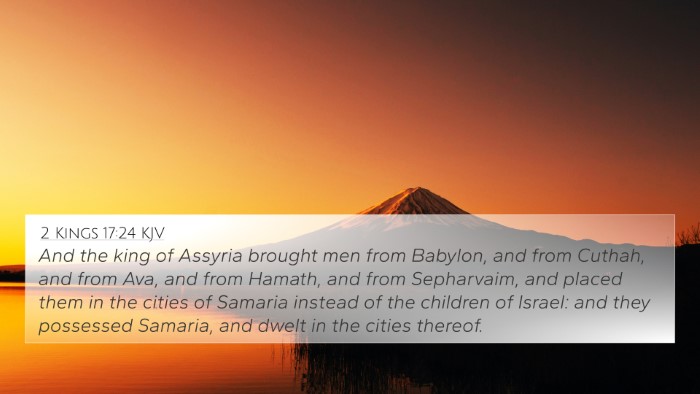
2 Kings 17:24 (KJV) »
And the king of Assyria brought men from Babylon, and from Cuthah, and from Ava, and from Hamath, and from Sepharvaim, and placed them in the cities of Samaria instead of the children of Israel: and they possessed Samaria, and dwelt in the cities thereof.

Ezra 4:1 (KJV) »
Now when the adversaries of Judah and Benjamin heard that the children of the captivity builded the temple unto the LORD God of Israel;

Romans 13:7 (KJV) »
Render therefore to all their dues: tribute to whom tribute is due; custom to whom custom; fear to whom fear; honour to whom honour.
Ezra 4:10 Verse Analysis and Similar Verses
Understanding Ezra 4:10
Ezra 4:10 states:
"The rest of the people, whom the great and noble Asnapper brought over, set them in the city of Samaria and the rest beyond the river, and at such a time." (Ezra 4:10, KJV)
Summary of Ezra 4:10
This verse introduces the people brought by Asnapper, indicating the geopolitical situation of the time when the Israelites faced opposition during the rebuilding of Jerusalem. It highlights the complexity in the restoration efforts as outside parties, namely the Samaritans, continued to influence the region.
Commentary Insights
Matthew Henry's Commentary
Henry emphasizes the historical context of this verse, noting it speaks to the origins of the Samaritans, who were a mix of Israelites and other nations. He explains that these people sought to integrate into the rebuilding process of Jerusalem, which was met with resistance by the returning exiles who desired to maintain the purity of their national identity and worship practices.
Albert Barnes' Commentary
Barnes elaborates on the significance of Asnapper's role in relocating these people, suggesting that it showcases the political maneuvers of the time, and how they affected the reconstruction of the temple and city. Through this lens, he advises readers to reflect on how outside influences can impact spiritual restoration and communal goals.
Adam Clarke's Commentary
Clarke notes that the naming of Asnapper and the people brought over serve to illustrate the tension between the Jews and the Samaritans. He indicates that this tension often revolved around who had the right to worship at the temple and the authenticity of worship practices among those who claimed heritage from the Israelites.
Significance of Ezra 4:10
Ezra 4:10 sheds light on the broader theme of restoration and identity within the Jewish community post-exile. The verse captures a moment where identity, authenticity, and the struggle for a pure form of worship become pronounced amid external influences.
Cross-References
In exploring the connections and thematic implications of Ezra 4:10, several Biblical cross-references emerge:
- 2 Kings 17:24: Discusses the origins of the Samaritans and the foreign nations settled in Israel.
- Ezra 4:1: Introduces the opposition faced by the Jews in rebuilding the temple.
- Nehemiah 4:2: Highlights the mocking of the Jews by their adversaries, emphasizing the societal tension.
- John 4:9: A New Testament reflection on the animosity between Jews and Samaritans during Jesus’ time.
- Matthew 10:5-6: Where Jesus instructs the disciples not to enter Samaria, showing ongoing tensions.
- Isaiah 56:3: Calls for inclusion but emphasizes the need for fidelity to God’s covenant.
- Malachi 1:14: Addresses concerns regarding proper worship and the offering of pure sacrifices.
- Acts 1:8: Shows the geographical and spiritual scope of the Gospel witness, including Samaria.
- 2 Chronicles 30:1-12: Chronicles an example of unity among the faithful Israelites despite past divisions.
- Romans 11:17-24: Discusses the Olive Tree analogy where the Gentiles are grafted in, showing a broader inclusion.
Exploring Connections
Ezra 4:10 provides a historical basis for understanding the dynamics between the returning Israelites and the surrounding peoples. In studying this verse, we also observe several key themes, including:
- The theme of restoration: The return from exile and the rebuilding of community.
- Identity and purity: The struggle to retain cultural and religious identity amid foreign influences.
- Political alliances and conflicts: Understanding the impact of external politics on spiritual goals.
- Inclusivity vs. exclusivity: The challenge of integrating different groups in worship and community.
Conclusion
In conclusion, Ezra 4:10 serves as a crucial study point for those examining the complexities of early Jewish identity and the rebuilding of community post-exile. By engaging with multiple Biblical texts through a cross-referencing approach, readers gain valuable insights into the significance of this verse and the enduring themes it conveys.
